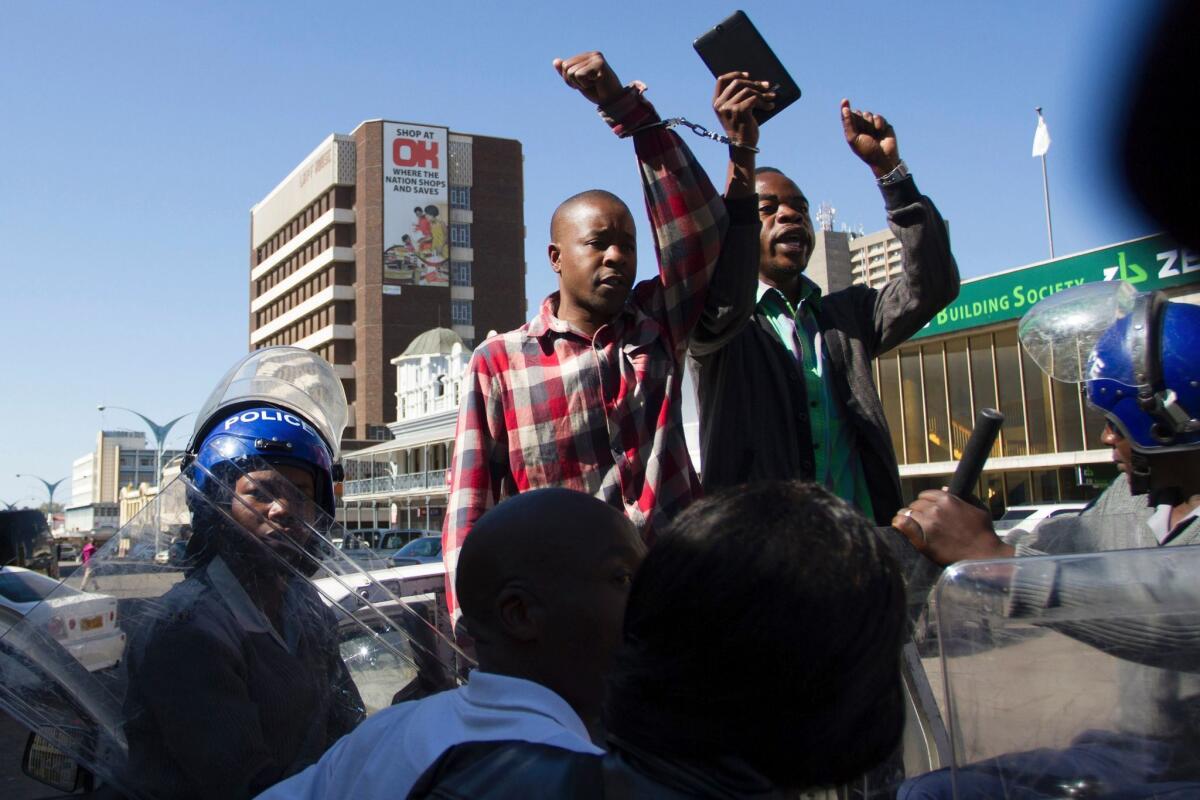A rare strike in Zimbabwe shakes the government of 92-year-old Robert Mugabe

Reporting from Johannesburg — It began on YouTube in April with one man’s frustrated lament for Zimbabwe. Wrapped in the national flag, railing against the country’s problems, Pastor Evan Mawarire broke a spell that had kept Zimbabweans silent for years, too fearful to protest their anger over government failures and abuses.
On social media, his hashtag #ThisFlag has become a rallying point for citizens angry over the economic and political crisis gripping their country and dire shortages of food and currency.
The hashtag was used to organize a general strike Wednesday as workers in the private sector and many civil servants stayed home to protest government corruption, the failure to pay civil servants’ wages on time and the country’s economic collapse.
Coupled with riots in Harare on Monday, the rare strike has shaken the government of President Robert Mugabe that has ruled since Zimbabwean independence in 1980.
Banks and businesses were closed in major cities, while Zimbabwean independent media reported clashes between riot police and protesters in the Mufakose neighborhood southeast of Harare and rioting in the Makokoba neighborhood in the southern city of Bulawayo.
In an interview on South African radio, Mawarire said the strike was a protest of the government’s failure to deal with corruption, injustice and poverty.
“We are tired and everyone identifies and agrees to say enough is enough,” he said. “The problem is the government has not learned how to respond to the citizens. They’ve always responded with a heavy hand. They respond with banning. They respond with threatening. They respond with intimidation.”
Zimbabwe faces severe shortages of American dollars — which have been its currency since 2009 — leaving the government unable to pay doctors, hospital staff, teachers, civil servants and other public sector employees on time. Many people are struggling to buy food and other staple goods, or pay school fees.
Zimbabwe abandoned its own currency because of rampant hyperinflation. In May, the government tried to reintroduce bond notes to replace American dollars, but the public has shown little confidence in the notes.
See the most-read stories in World News this hour >>
The government also attempted to ban imports of many goods from South Africa in hopes of boosting local businesses. But because Zimbabwe doesn’t produce many of those items itself, the move only outraged much of the public.
Opposition protests and strikes have often flopped. Mawarire lauded Wednesday’s work stoppage as a success. “Fed up and not afraid,” he posted on Facebook, adding the slogan, “Bolder Citizens, A Better Zimbabwe.”
Jonathan Moyo, a government education minister and close Mugabe ally, warned that people could be fired for failing to come to work.
“A day like this presents immense opportunities to discover who is who & what they are really up to. Tremendous!” he posted on Twitter.
Moyo indicated late in the day that the stoppage had some impact in cities but declared it a failure in rural areas, tweeting: “So the success of the stay away, shutdown or whatever, was 20% at most & only in towns like Harare while it was 0% in most of the country!”
The Herald, a government-owned newspaper, warned in a tweet Wednesday morning that police were “ready to deal with rogues.” It also reported the arrest of a man in Bulawayo armed with grenades, which he “intended to use to foment anarchy” during the strike.
The battle between the government and the people also appeared to play out in the digital realm, as the government warned that anyone sharing “subversive” messages or posts on social media could be traced and would be prosecuted.
When the popular messaging app was disabled for several hours, leaving protesters unable to communicate with each other, activists blamed the government. A hacker with the Twitter handle 0011Send1 claimed responsibility for temporarily shutting down the websites of the government, ruling party and state broadcasting company.
The work stoppage followed violent clashes Monday between police and commuter mini-bus drivers who were protesting police harassment and demands for bribes.
The protests come as 92-year-old Mugabe faces deep scrutiny over his basic fitness for the job. Over the last year, he has fallen asleep in public meetings, stumbled in public and read the wrong speech in parliament without realizing it.
Despite all that, he has insisted that he will govern to the age of 100.
Factions of his ruling ZANU-PF party, however, are already fighting over who will succeed him.
Speculation is mounting in Zimbabwe’s independent press that his wife, Grace Mugabe, may eventually try to win control of the presidency. Over the last year, the ruling party has purged dozens of members who have expressed support for a rival, Emmerson Mnangagwa, the deputy president and a former security minister.
MORE WORLD NEWS
South Korea’s newest menace: ‘Smartphone zombies’
Here’s who carried out the Bangladesh attack: Mostly students from middle-class families
Brazil is in turmoil, an impeachment trial looms, and still, Dilma Rousseff laughs
More to Read
Sign up for Essential California
The most important California stories and recommendations in your inbox every morning.
You may occasionally receive promotional content from the Los Angeles Times.










